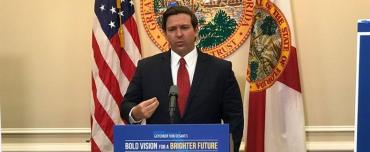
Florida Gov. Ron DeSantis continues to ride a wave of popularity among Florida voters, who also support many of his public policy priorities, including the importation of prescription drugs from Canada to reduce costs to Floridians and the creation of a task force to reduce the impact of harmful algae blooms, according to a statewide survey by the Florida Atlantic University Business and Economics Polling Initiative (FAU BEPI).
In fact, his lingering "honeymoon" among Florida voters could lift the president's popularity in 2020, poll tabulators say.
DeSantis enjoys a 54 percent approval rating, up six points from last month’s BEPI survey, with 19 percent disapproval and 27 percent of voters unsure about the new governor. Democrats were less enthusiastic about DeSantis, with 37 percent approval compared with 31 percent disapproval. Independents gave DeSantis 51 percent approval to 12 percent disapproval; Republicans registered 72 percent approval and 11 percent disapproval.
U.S. President Donald Trump’s approval rating among Florida voters rose to 44 percent (up from 41 percent in the last poll), with 45 percent disapproval. However, when asked if they think Trump has any responsibility for the recent rise in hate crimes, more than half of Floridians surveyed believe he has some level of responsibility with 35 percent of Floridians saying he was very responsible and 20 percent saying he’s somewhat responsible.
Voters also were asked about several public policy proposals being discussed in Tallahassee. Importing prescription drugs from Canada to help lower costs to Floridians, included in legislation approved earlier this week by a state Senate committee and a DeSantis proposal, won 75 percent support among survey respondents, with only 12 percent opposition. This question had the strongest appeal across all demographics, including gender, party affiliation, race, age, education and region.
“The support is overwhelming among Floridians to import prescription drugs from Canada in an effort to lower prescription costs,” said Monica Escaleras, Ph.D., director of the BEPI. “It’s one of many popular proposals from Gov. DeSantis that has his honeymoon continuing in Florida.”
DeSantis’ proposal to create a task force to reduce the impact of harmful algae blooms was also widely popular among voters, with 63 percent support and 16 percent opposition. The expansion of school voucher programs for middle-income families, included in a bill recently passed by a Florida House panel, garnered 52 percent support and 29 percent opposition. Banning fracking (also known as hydraulic fracturing) to explore for oil and natural gas was also popular, with nearly half of those surveyed (49 percent) supporting a ban on all kinds of fracking in Florida, while 31 percent oppose a ban.
“Florida looks once again to be a key swing state in the upcoming elections,” said Kevin Wagner, Ph.D., professor of political science at FAU and a research fellow of the Initiative. “Opinions on the performance of the president are sharply divided, but Republicans may be lifted by the continuing strong support shown for Gov. DeSantis.”
Floridians by a margin of 46 to 34 percent support banning sanctuary cities to prevent local governments from passing ordinances that limit cooperation with federal immigration authorities. Allowing teachers to carry firearms on school property was opposed by 50 percent of those surveyed, while 38 percent approved.
The survey was conducted March 22-24 and polled 500 Florida registered voters. It was conducted using an online sample supplied by Survey Sampling International using online questionnaires and via an automated telephone platform (IVR) using registered voter lists supplied by Aristotle, Inc. The survey has a margin of error of +/- 4.3 percentage points. Responses for the entire sample were weighted to reflect the statewide distribution of the Florida population. The polling results and full cross-tabulations are available by clicking HERE.


